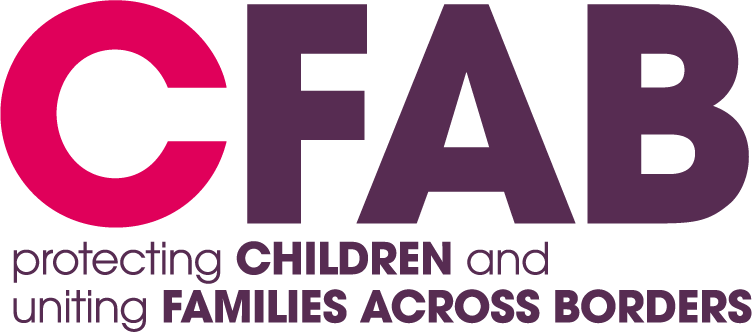CFAB promotes International Kinship Care Guide for Placing Looked After Children with Family Overseas
November 2020
In collaboration with the Cross-Border Child Safeguarding (CBCS) Working Group, a number of government departments, child protection agencies, and local authority social workers, CFAB is promoting a guide on international kinship care placements and minimising breakdown when Looked After Children are placed with family overseas.
Access the International Kinship Care Guide here.
“A great piece of work that I very much hope is adopted and read widely.” Daisy Veitch, Social Work Adviser, Consular Assistance Department. Foreign, Commonwealth & Development Office
“This is a comprehensive guide for professionals exploring family placements abroad for children, and many of the considerations here will apply for other forms of care. It bridges the gaps between various domestic policies and legislation.” Anne Longfield, Children’s Commissioner for England
In CFAB’s 65 years in operation, we have consistently sought the best possible options for children on the move across international borders: from resettling children after the Second World War to supporting unaccompanied children fleeing war in the Middle East. Our expertise, paired with that of the organisations who have kindly offered their support, has allowed us to produce this guide, the first of its kind to comprehensively address good practice for placing Looked After Children currently in care in the UK into the care of a family member(s) who lives in another country. The overarching aim is to ensure overseas families are included as one of the options explored for children in care and to provide local authorities with tools and knowledge so that family members overseas are not unnecessarily ruled out as potential carers for children in care in the UK, particularly if this option is in the best interest of the child.
Why is further guidance needed?
In 2019, 34.3% of all children born in England and Wales had either one or both parents born outside of the UK, up from 33.8% in 2018[1]. With more children on the move than ever before and increasing numbers of multinational and foreign-national families - and with 78,150 children in care in England alone[2] - CFAB estimates more than 18,000 Looked After Children in England and Wales may have family members abroad that could and should be explored as options for their long-term care.
Despite the benefits that are associated with international kinship care placements - such as allowing the child to maintain a sense of family identity - these placements are rarely considered as a long-term and permanent option for children and young people currently in care in the UK.
"All local authorities should read this. It's robust and comprehensive, I am sure social workers will find it helpful." Victoria Roberts, Barrister, Coram Chambers
What does the guidance cover?
Broadly, the guidance sets out:
- the steps which should be taken whilst assessing potential carers overseas,
- recommendations for the ongoing relationship between the relevant authorities in each country to ensure that responsibilities are clear and are mutually agreed, and
- barriers to permanency which would need to be considered before placement, or which would need additional support for the child and carer in order to ensure that the child has a successful and permanent placement.
“It is currently unknown how many Looked After Children in the whole of the UK have family overseas that could potentially care for them. Whilst the wider consideration of international kinship care placements for children should be actively encouraged, the delicate and complex nature of these placements requires specialist and comprehensive guidance to provide local authorities with the tools to ensure these placements are a success.” Carolyn Housman, CEO of CFAB and Chair of the CBCS
"An exceptional piece of work - detailed, insightful, respectful, timely." John Simmonds, Director of Policy, Research and Development, CoramBAAF
Where can I find out more?
If you have any questions about this guidance and how it may affect your practices, or if you want to discuss any training opportunities, please contact CFAB’s free advice line on 020 7735 8941 or at info@cfab.org.uk or follow us on Facebook and Twitter #IKC.
[1] Office of National Statistics (2020), ‘Birth by parents’ country of birth, England and Wales: 2019’ [Online] https://www.ons.gov.uk/peoplepopulationandcommunity/birthsdeathsandmarriages/livebirths/bulletins/parentscountryofbirthenglandandwales/2019#country-of-birth-of-non-uk-born-mothers-and-fathers
[2]Department for Education (2019) ‘Children looked after in England (including adoption), year ending 31 March 2019, [online] https://assets.publishing.service.gov.uk/government/uploads/system/uploads/attachment_data/file/850306/Children_looked_after_in_England_2019_Text.pdf


